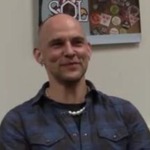Interviewer: Avery Carr, Alice Desai and Aitofi (Tofi) Mago
Interview Date: February 16, 2020
Location: The Valley Library, Oregon State University
Duration: 2:02:28
DJ Travers is a former member and one of the “founding mothers” of the Lesbian Avengers in Corvallis. Travers speaks of his early childhood when he was known as Amy. He mentions that growing up he always wanted to dress in more boy clothes and that he would try to sneak his brother’s clothes but eventually got caught by his mother. He also mentions that he grew up with strict and conservative parents which made it really difficult for him to understand who he was. He explains his fear of being sent to get psychiatric care and his parents’ fear when he came out that he would sexually prey upon his younger sisters; at that time, those who identified as part of the LGBTQ+ community were seen as child predators. He then talks about school and how he was not aware of anyone around him being in the LGBTQ community, because no one was really out. He also speaks of choosing Oregon State University because of its program in his chosen field.
Travers then speaks of his role in the Lesbian Avengers. He explains how he initially heard about the Lesbian Avengers because of the uproar in New York after the murders of Oregon residents Hattie Mae Cohen and Brian Mocks, and how it felt crazy that the murders had happened in Oregon, yet he never even heard about it. He and a few other people banded together in order to strengthen the community and show that they were here to stay. He mentions his experience that during the 1990s, if you weren’t a white cis-gendered male, school was going to be really hard for you and the OSU administration wouldn’t do much about it. Travers explains that he wanted to incorporate other communities into the Lesbian Avengers in order to strengthen their group, much to the dismay of Sarah Schulman, the New York based scholar and founder of the Lesbian Avengers. But he argues that we were all in the same struggle of not being able to fit in the “normal” groups that society had created and being criticized for it unfairly.
From there, Travers turns to his current views and his life. He talks about the expansion and increased inclusivity of language related to queer identities. He explains that he loves the fact that we are learning and arguing and getting into more depth about the words we use, because we should really learn how to express ourselves the way we want to. He discusses the Lesbian Avengers’ work in going to local high schools and helping the students create GSAs in their schools when no one else would help. People admired Travers for his willingness to help and would often come to him when they didn’t know where else to go. When asked what he would say to his younger self if he had that opportunity, he said that he knows that his younger self would probably be so confused, but he would just say that they are going to get through it and that they will find people who will love them for who they are. Although it won’t be easy, it will all be worth it.
Dublin Core
Title
Description
Travers then speaks of his role in the Lesbian Avengers. He explains how he initially heard about the Lesbian Avengers because of the uproar in New York after the murders of Oregon residents Hattie Mae Cohen and Brian Mocks, and how it felt crazy that the murders had happened in Oregon, yet he never even heard about it. He and a few other people banded together in order to strengthen the community and show that they were here to stay. He mentions his experience that during the 1990s, if you weren’t a white cis-gendered male, school was going to be really hard for you and the OSU administration wouldn’t do much about it. Travers explains that he wanted to incorporate other communities into the Lesbian Avengers in order to strengthen their group, much to the dismay of Sarah Schulman, the New York based scholar and founder of the Lesbian Avengers. But he argues that we were all in the same struggle of not being able to fit in the “normal” groups that society had created and being criticized for it unfairly.
From there, Travers turns to his current views and his life. He talks about the expansion and increased inclusivity of language related to queer identities. He explains that he loves the fact that we are learning and arguing and getting into more depth about the words we use, because we should really learn how to express ourselves the way we want to. He discusses the Lesbian Avengers’ work in going to local high schools and helping the students create GSAs in their schools when no one else would help. People admired Travers for his willingness to help and would often come to him when they didn’t know where else to go. When asked what he would say to his younger self if he had that opportunity, he said that he knows that his younger self would probably be so confused, but he would just say that they are going to get through it and that they will find people who will love them for who they are. Although it won’t be easy, it will all be worth it.

